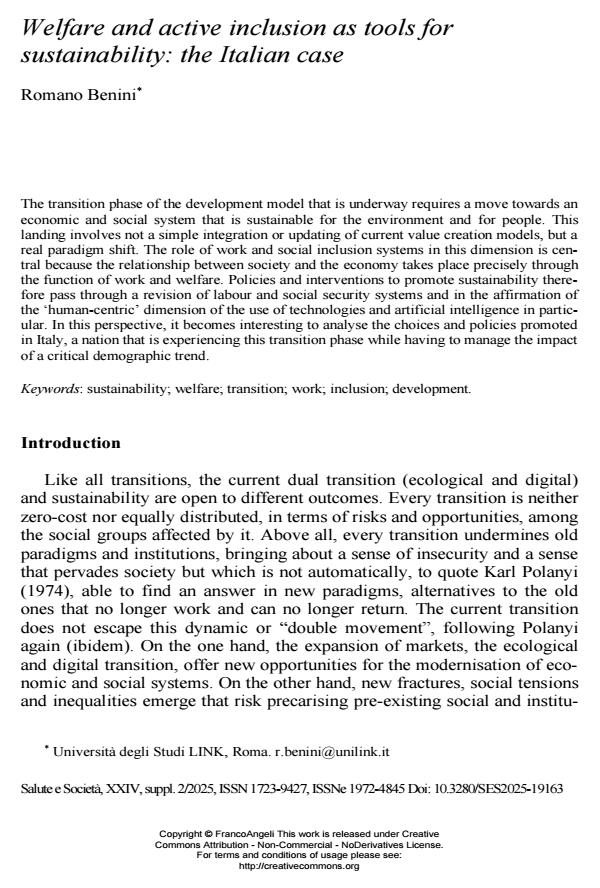Welfare and active inclusion as tools for sustainability: the Italian case
Titolo Rivista SALUTE E SOCIETÀ
Autori/Curatori Romano Benini
Anno di pubblicazione 2025 Fascicolo 2025/2 Suppl.
Lingua Inglese Numero pagine 14 P. 64-77 Dimensione file 404 KB
DOI 10.3280/SES2025-19163
Il DOI è il codice a barre della proprietà intellettuale: per saperne di più
clicca qui

FrancoAngeli è membro della Publishers International Linking Association, Inc (PILA)associazione indipendente e non profit per facilitare (attraverso i servizi tecnologici implementati da CrossRef.org) l’accesso degli studiosi ai contenuti digitali nelle pubblicazioni professionali e scientifiche
The transition phase of the development model that is underway requires a move towards an economic and social system that is sustainable for the environment and for people. This landing involves not a simple integration or updating of current value creation models, but a real paradigm shift. The role of work and social inclusion systems in this dimension is central because the relationship between society and the economy takes place precisely through the function of work and welfare. Policies and interventions to promote sustainability therefore pass through a revision of labour and social security systems and in the affirmation of the ‘human-centric’ dimension of the use of technologies and artificial intelligence in particular. In this perspective, it becomes interesting to analyse the choices and policies promoted in Italy, a nation that is experiencing this transition phase while having to manage the impact of a critical demographic trend.
Parole chiave:sustainability; welfare; transition; work; inclusion; development.
- Bank of Italy (2024). Annual Report 2024. Rome: Bank of Italy.
- Benassi D., Ciarini A., Mingione E. (2021). Inequalities and the City. Gender, Ethnicity, and Class. In: Orum A., Ruiz-Tagle J., Vicari-Haddock S., eds., Companion to Urban and Regional Studies, pp. 373-397, Hoboken, NJ: Wiley Blackwell.
- Castells M. (1996). The Rise of network society. Oxford: Blackwell Publishers Ltd. Durkheim É. (1893). La divisione del lavoro sociale. Torino: Einaudi.
- Esping-Andersen G. (1990). The Three Worlds of Welfare Capitalism. Princeton: University Press.
- Esping-Andersen G., et al., eds., (2002). Why We Need a New Welfare State. Oxford: Oxford University Press.
- European Commission: Directorate-General for Employment, Social Affairs and Inclusion (2023). Joint Employment Report 2024 : Commission proposal. Publications Office of the European Union. Testo disponibile al sito: https://data.europa.eu/doi/10.2767/17157 (12/06/2025).
- European Commission (2024). Commission staff working document. Country analysis on social convergence in line with the features of the Social. Convergence Framework (SCF). European Commission: Bruxelles.
- Hemerijck A. (2013). Changing Welfare States. Oxford: Oxford University Press. Hemerijck A. (2017). The Uses of Social Investment. Oxford: Oxford University Press.
- G7 Italia Labour and Employment Issue notes (2024). Towards an inclusive human-centered approach for new challenges in the world of work. (G7 Labour and Employment Ministers’ Meeting in Cagliari 12-13 September 2024 Ministerial Declaration).
- INAPP (2022). I divari sulle competenze. Approfondimenti territoriali e in ottica di genere. INAPP Report n. 27. Roma: INAPP.
- INAPP (2024). Le competenze cognitive degli adulti in Italia prime evidenze dall’indagine Ocse-Piaac. Roma: INAPP.
- ISTAT (2024). La formazione degli adulti – anno 2022. Testo disponibile al sito: https://www.istat.it/comunicato-stampa/la-formazione-degli-adulti/ (08/04/2024).
- Mereu M.G., a cura di (2024). Inapp Scenari di medio termine per l’economia e l’occupazione. INAPP Report n. 46. Roma: INAPP.
- Mineo S., Amendola A., a cura di, (2018). Focus PIAAC: i low skilled in literacy. Profilo degli adulti italiani a rischio di esclusione sociale. INAPP Paper n.7. Roma: INAPP.
- OECD (2023). Pensions at a Glance 2023: OECD and G20 Indicators. Paris: OECD Publishing.
- OECD (2024a). Do Adults Have the Skills They Need to Thrive in a Changing World? Survey of Adult Skills 2023, OECD Skills Studies. Paris: OECD Publishing.
- OECD (2024b). Survey of Adult Skills 2023 Reader’s Companion. Paris: OECD Publishing.
- OECD (2024c). OECD Economic Outlook, Volume 2024 Issue 2. Paris: OECD Publishing.
- Pierson P. (2001). The New Politics of the Welfare State. Oxford: Oxford University Press.
- Polanyi K. (1974). La grande trasformazione. Torino: Einaudi.
- Rosina A., a cura di (2024). CNEL Rapporto 2024. Demografia e forza lavoro. Testo disponibile al sito: https://www.cnel.it/Portals/0/CNEL/Comunicazione/programmi%20eventi%20 2.12.2024%20a%206.12.2024/Rapporto_demografia_forzalavoro_18dic24%20 FINALE_OK%20(3).pdf?ver=2024-12-19-142412590×tamp=1734618257258 (12/06/2025).
- Zuboff S. (2019). The Age of Surveillance Capitalism. London: Profile book.
Romano Benini, Welfare and active inclusion as tools for sustainability: the Italian case in "SALUTE E SOCIETÀ" 2 Suppl./2025, pp 64-77, DOI: 10.3280/SES2025-19163